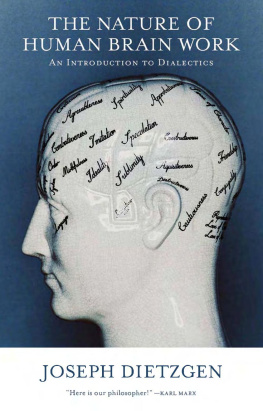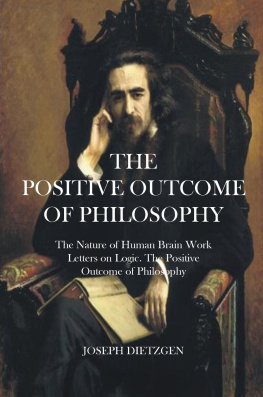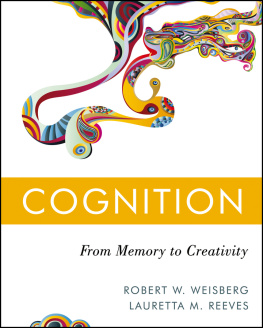Joseph Dietzgen - Our Professors on the Limits of Cognition
Here you can read online Joseph Dietzgen - Our Professors on the Limits of Cognition full text of the book (entire story) in english for free. Download pdf and epub, get meaning, cover and reviews about this ebook. year: 2016, genre: Science. Description of the work, (preface) as well as reviews are available. Best literature library LitArk.com created for fans of good reading and offers a wide selection of genres:
Romance novel
Science fiction
Adventure
Detective
Science
History
Home and family
Prose
Art
Politics
Computer
Non-fiction
Religion
Business
Children
Humor
Choose a favorite category and find really read worthwhile books. Enjoy immersion in the world of imagination, feel the emotions of the characters or learn something new for yourself, make an fascinating discovery.

- Book:Our Professors on the Limits of Cognition
- Author:
- Genre:
- Year:2016
- Rating:3 / 5
- Favourites:Add to favourites
- Your mark:
- 60
- 1
- 2
- 3
- 4
- 5
Our Professors on the Limits of Cognition: summary, description and annotation
We offer to read an annotation, description, summary or preface (depends on what the author of the book "Our Professors on the Limits of Cognition" wrote himself). If you haven't found the necessary information about the book — write in the comments, we will try to find it.
Our Professors on the Limits of Cognition — read online for free the complete book (whole text) full work
Below is the text of the book, divided by pages. System saving the place of the last page read, allows you to conveniently read the book "Our Professors on the Limits of Cognition" online for free, without having to search again every time where you left off. Put a bookmark, and you can go to the page where you finished reading at any time.
Font size:
Interval:
Bookmark:

First published: in Vorwarts, 1878;
Source: Joseph Dietzgen, Philosophical Essays (ed. Eugen Dietzgen & Joseph Dietzgen Jr.), Charles H. Kerr & Co., Chicago 1906, pp. 236-253.
Translated: by Theodore Rothstein & Max Beer.
Transcribed: by Einde OCallaghan for the Marxists Internet Archive.
I
At the Fiftieth Meeting of German Naturalists and Physicians, held at Munich, September, 1877, Professor C.V. Ngeli, of Munich, took up a well known lecture of his Berlin colleague, Du Bois-Reymond, and delivered a remarkable address on the Limits of Scientific Knowledge. One is bound to admit that the Munich professor has, in point of truth and clearness, far surpassed his Berlin colleague; still he, too, was unable to rise to the level of his time.
He nearly explained the whole thing; but the small point which he missed at the conclusion is just the vital point, the one which marks the wide gulf that divides physics from metaphysics, sober science from romantic belief. Such a lecture, proceeding as it does sharply up to that point, offers a welcome opportunity to show once more the superiority of the Social-Democratic conception of the world.
Prof. Ngeli treats his subject in the following manner:
Many methodical scientists who, by their exact mode of research, augment the stock of well based facts, while holding a fundamental solution inadmissible, answer the question as to the Limits of Knowledge of Nature by a simple statement of fact: Belief invariably begins where knowledge ends. The statement that our belief begins where knowledge ends the lecturer continues is a practical solution for certain definite purposes. Our interest is not satisfied thereby. We turn our special attention to the theoretical side of the problem. We want to know whether the limits where human knowledge must stop are at all definable, and if so, how far can knowledge penetrate into the domain of Nature; how much of Nature could the human mind conceive, if it were to occupy itself during an unlimited time say, an eternity with natural sciences and have at its command all imaginable means of research, in a word, what is the fundamental line of demarkation between the domain of knowledge and that of belief?
As is well known, his predecessor, Du Bois-Reymond, tried to prove that there really is such an impassable line of demarkation, that consequently belief will, under all circumstances, have a domain of its own left to it. It is only owing to the reservation of this little refuge for religious romanticism that his lecture has gained its seeming importance and popularity. Since that time the champions of the Inconceivable have not ceased singing Hosanna. True enough, Prof. Ngeli is little edified by this song, but his official privileged position as a professor does not allow him to enter the fight in a whole hearted manner. After showing his predecessor clearly and by all manner of means that he has misunderstood the nature of scientific knowledge, he concludes as follows: Du Bois-Reymond winds up his lecture with the crushing words, Ignoramus and Ignorabimus. I should like to conclude mine with the qualified, but withal, consoling expression of opinion that the fruit of our researches is not merely knowledge, but actual truth which contains within itself the germ of an almost (!) infinite growth, without thereby coming nearer by the smallest step to omniscience. If we adopt an attitude of a reasonable resignation, if we, as finite and transient beings that we are, content ourselves with human knowledge instead of claiming divine cognition, then we may say with full confidence in ourselves and in the future: We know and we shall know.
These concluding remarks contain the essence of the question. They also unmistakably express both the religious and subservient consciousness of the Berlin professor and the tame and timid inconsistency of the Munich one. The religious romanticism of Du Bois-Reymond calls all results of scientific research merely knowledge, and not real truth. Such true cognition is not attainable by the poor human understanding. The professor literally says that the whole of our knowledge of Nature is in reality not cognition, but a substitute of an interpretation.
Our science, then, can only yield chicory instead of coffee. Our scientific interpretation may very well allow itself to be buried, perhaps it may rise transfigured on the day of judgment. And such reactionary word-splitting wants to dominate our universities!
Then comes the other one, Ngeli, to whom that pious resignation seems rather too strong. The nice distinction between knowledge and cognition does not recommend itself to him. He is convinced that we know and shall know. But observe how gently he breaks this news to us: without thereby coming nearer to omniscience by the smallest step. He, too speaks humbly of human cognition as against that of the higher Non-Humanity. We must submit to a rational resignation and lay no claim to divine knowledge. Is it possible that so learned a professor should resign himself monklike to divine cognition and even call such resignation rational? All natural cognition is divine, that is, glorious and wonderful. When, however, our professor opposes to human cognition a divine one, then he proceeds beyond the limits of Nature and lands in the same romanticism in which his predecessor has landed before him.
II
The Munich professor has clearly shown to his Berlin colleague that by not recognizing our knowledge of Nature as a real, true cognition, he demonstrated not the limits, but the inanity or absolute impossibility of scien tific cognition. And, consequently, he stands at a purely negative point of view. According to Ngeli, Du Bois-Reymond teaches as follows:
Cognition of Nature is the reduction of a natural phenomenon to the mechanics of simple, indivisible atoms.
Atoms in this sense do not exist and, consequently, no real cognition exists.
Even if the world could be understood out of the mechanics of the atoms we would still be unable to understand out of these atoms apperception and consciousness.
On this Ngeli justly remarks: Since the speaker does not proceed beyond mere negation, natural science cannot, in its lack of a proper domain, draw its limits either, and if it is for ever unable to gain an insight even in the material phenomena, it matters little whether it may possibly lay claim to the spiritual domain. In other words, if our knowledge yields instead of coffee only chicory, then we only have one bad brew and nothing else. There is nothing good left which it would be worth while to investigate, to understand or to place within its proper limits.
After one professor has thus settled the other, the pleasant duty remains for us to show, what, however, must be clear already, that the Munich professor, too, has landed where the other one was caught. Herr Ngeli differs from Du Bois-Reymond in that he has so far broken loose that it is difficult to judge whether it was because his strength has failed him or on account of decorum, that he felt himself obliged to keep to the mysterious land of presentiment, to the divine cognition and omniscience and such like things which surpass our human faculties.
As regards the faculty of the Ego to know of natural things, the decisive and undoubted fact is that, however our faculty of thinking is constituted, only the sensory perception offers us any knowledge of Nature. If we did not see and hear, did not taste, smell or touch anything we could not altogether know that something exists outside us, nay, that we ourselves are corporeal.
These are brave words. Let us adhere to them and see whether our professor sticks to them also.
Our sensory perception, says our lecturer, is limited to the present.
Next pageFont size:
Interval:
Bookmark:
Similar books «Our Professors on the Limits of Cognition»
Look at similar books to Our Professors on the Limits of Cognition. We have selected literature similar in name and meaning in the hope of providing readers with more options to find new, interesting, not yet read works.
Discussion, reviews of the book Our Professors on the Limits of Cognition and just readers' own opinions. Leave your comments, write what you think about the work, its meaning or the main characters. Specify what exactly you liked and what you didn't like, and why you think so.



